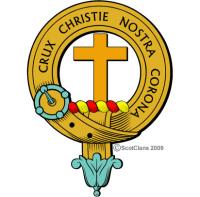
Clan Mercer
The name Mercer comes from the French word mercier. It is a name of occupational origin, referring to someone who is a merchant in textiles or cloth.
Two charters were witnessed by William Mercer or le Mercer for the Abbey of Kelso, in or around 1200.
In 1244, Aleumnus Mercer, along with twenty-three others, was party to a bond given by Alexander II to England's Henry III to keep the peace between the two countries. Aleumnus also had a grant of Tillicoultry, Clackmannanshire, from Walter, son of Alan.
In English records, an interesting story appears about two Mercers which gives a curious insight into the laws of the time. In 1279 "a man unknown was housed at Morpathe (Morpeth, Northumberland) with Geoffrey and William, the mercers of Scotland. The stranger rose through the night and stole their goods to the value of 30 shillings, and instantly fled to Cotinwode, followed by William, who slew him in his flight. Both withdrew themselves and are not discredited. They may return and if they will, but their chattels are confiscated for flight." Apparently it was lawful to chase a thief, and then carry out summary justice, providing the culprit had been caught with the goods in their possession. However, the Mercers did not pursue the thief in the recognisied and allowed manner.
Other noted Mercers include Duncan Mersar who was witness in Aberdeen in 1272, and he is probably the Duncan Mercener who was witness to a charter by Martin Aurifaber nine years later, in 1281.
In 1296, Wauter le Mercer, burgess of Montrose, Bernard le Mercer, burgess of Perth, and Austyn le Mercer, burgess of Roxburgh all paid homage to Edward I of England by signing the Ragman Rolls.
The Mercers of Aldie and the Mercers of Innerpeffry in Strathearn are both old families of this name.
The Mercers of Aldie were very much involved with the history and prosperity of Perth.
It seems to be that the founder of this branch was a Thomas. In 1341, Thomas received an order from England's Edward III for money for the purpose of raising men and horses for service in Aquitania, in south-west France. In the second half of the 14th century, John Mercer, who was a wealthy burgess of Perth, flourised and was provost of the town in 1357, 1369, and 1374, and in 1355 he was commissioner for Perth to arrange for the liberation of David II. During a truce in 1376, Thomas was taken prisoner by the English, but was released, for no ransom, not long after, much to the annoyance of Walsingham, who is very aware of Thomas' "inestimable wealth".
An old rhyme refers to the age of the Mercer family in Perth,
"So sicker 'tis as anything on earth,
The Mercers aye are older than old Perth."
Another rhyme, this own of a satirical nature, refers to the exchange of the two Inches of Perth (where the famous clan battle was fought in 1396) for the right of the burial chamber in St. John's Church, in Perth.
"Folk say the Mercers tried the town to cheat,
When for two Inches they did win six feet."







